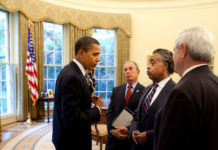In 1987, a young, African-American woman named Tawana Brawley was found lying inside a garbage bag, reportedly “unconscious” and covered in feces and racial epithets. Brawley became an overnight media sensation, largely because her claim of having been raped by six white men was trumpeted by the then-largely unknown Rev. Al Sharpton and two other “activists,” as a symbol of systemic racism in America. Several months later, a grand jury found Brawley’s story to be a lie, and a Sharpton associate condemned the Reverend and his cohorts as “frauds from the beginning.”
Rather than slink away in shame as many individuals would do after being called out publicly as a bald-faced liar, Sharpton welcomed the spotlight and unapologetically built a lucrative empire based on the notoriety spawned by the Tawana Brawley scandal.
Insofar as many of Sharpton’s claims in the intervening years have been patently, if not deliberately outrageous, it has been easy to dismiss him as a comic performer – albeit one sufficiently savvy to milk MSNBC for millions as a host of his own cable TV show. However, with his most recent foray into the public policy arena in Baltimore, Sharpton has crossed the line from simply being amusing to being dangerous.
Sharpton poses no threat himself as a person (it is still difficult for most Americans to take him seriously). The real problem is that the nonsense he spouts is considered by much of the media and by many high-ranking officials as a credible element of the public policy debate about law enforcement, criminal justice, and the role of the federal government in America. He is treated like a rock star in many places; including 1600 Pennsylvania Avenue.
The average citizen can enter the White House only as a visitor after securing one of a limited number of tickets available each day, and after waiting in line before going through security. On the other hand, Al Sharpton – a documented tax scofflaw – is a welcome guest at 1600 Pennsylvania Avenue. He is invited there by Barack Obama himself; so the President can glean wisdom and understanding from the man who gave us Tawana Brawley but who reinvented himself as a self-styled race relations expert.
It was, of course, no surprise to anyone that Sharpton would jump into the controversy spawned by the Freddie Gray shooting in Baltimore late last month. The only surprise may have been that he waited a couple of days before weighing in. But when he did weigh in, he really weighed in – with one of most historically-perverse proposals imaginable; even for a man who has made a career out of uttering outrageous things.
What is Sharpton’s solution to the Baltimore incident? – To have the federal Department of Justice “step in and take over policing in this country.” Sharpton followed this recipe for nationalizing law enforcement, as told the Baltimore Sun, with this non sequitur: “In the 20th century, they had to fight states’ rights in — to get the right to vote. We’re going to have to fight states’ rights in terms of closing down police cases.”
Sharpton’s notion of federalizing law enforcement would be laughable, were it not for the fact that among his not-insubstantial army of followers, he continues to be treated as a purveyor of substantive and credible ideas. For example, Baltimore’s Mayor Stephanie Rawlings-Blake – who had encouraged demonstrators and looters by publicly offering them “space” in which to “destroy” – welcomed Sharpton’s entry to the fray.
Surprisingly, Republicans, too, shore up Sharpton’s credibility by refusing to call him out for his antics. GOP presidential candidate Ben Carson, for example, in last month’s National Review, said meekly that he and Sharpton “have the same goal” – to “build a brighter, stronger America” — simply a different view of how to achieve it. This ranks as something of an understatement. Carson’s “way to achieve” his stated goal is to understand and substantively debate important public policy issues. Sharpton’s way is to milk the system by advocating outrageous ideas, based on a complete rejection of the principles on which our system of government is founded (principles such as individual responsibility, federalism, and separation of powers).
So long as Carson and others speak of Sharpton as if he is a credible person on par with them — rather than the unabashed self-promoter he is — then the longer Sharpton will continue to enjoy notoriety and credibility far in excess of that to which he otherwise would be entitled. And so long as presidents and attorneys general of the United States lend an ear to Sharpton’s ramblings, the deeper will grow the roots of those warped ideas.





























